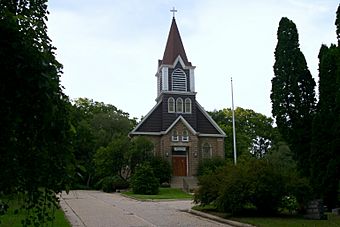Dansk Evangelical Lutheran Kirke facts for kids
Quick facts for kids |
|
|
Dansk Evangelical Lutheran Kirke
|
|

Dansk Evangelical Lutheran Kirke
|
|
| Location | 400 W. Capitol Dr., Hartland, Wisconsin |
|---|---|
| Area | 1.9 acres (0.77 ha) |
| Built | 1910 |
| Architectural style | Late Gothic Revival, Romanesque Revival |
| MPS | Hartland MRA |
| NRHP reference No. | 86003422 |
| Added to NRHP | April 21, 1988 |
The Dansk Evangelical Lutheran Kirke is a beautiful church in Hartland, Wisconsin. It was built in 1910 by people who came from Denmark. This church is designed in a style called Gothic Revival.
It is a very important building. In 1988, it was added to the National Register of Historic Places. This means it is recognized as a special historical site in the United States.
The Church's Story
Early Danish Settlers
Danish families started moving to the Hartland area around 1845. Many more arrived between 1855 and 1861. These immigrants brought their traditions and their faith with them.
In 1867, a group of these settlers met. They wanted to start a Lutheran church. They decided to welcome everyone who wanted to help. Services would be in English, but German or Danish could also be used.
The next year, the Danish and German communities built their first church. It was located on Oconomowoc Street.
Building the New Church
By 1910, the Danish and German groups decided to have separate churches. The Danish members bought the old church building. They took it down to build a new one. This new building is the church you see today.
The walls of the church are made from concrete blocks. They have a rough, rocky look, which is a bit like the Romanesque Revival style.
However, the tall, pointed windows and the steeple reach high into the sky. These features are typical of Gothic Revival buildings. The front of the church also has shingles, a decoration often seen on Queen Anne-style homes.
J.P. Peterson from Hartland was the main builder. Nels Lund, from Menomonee Falls, did the concrete work.
Changes Over Time
For many years, from 1918 to 1931, half of the church services were still spoken in the Danish language. This helped the Danish community stay connected to their heritage.
In 1975, the church changed its name. It became known as the Lake Country Congregational Church.
 | Selma Burke |
 | Pauline Powell Burns |
 | Frederick J. Brown |
 | Robert Blackburn |

